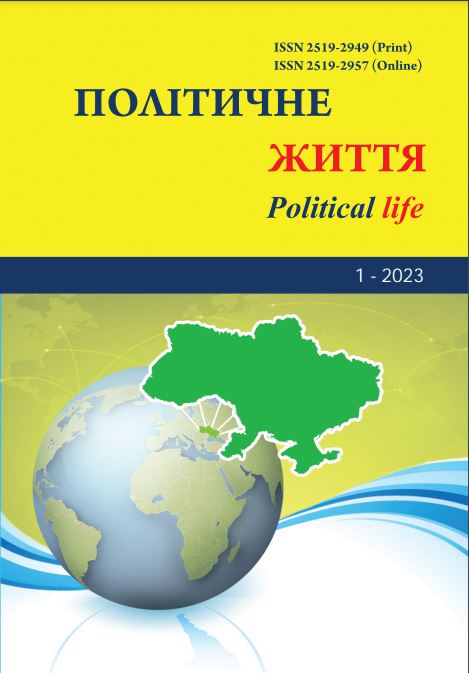Electoral activity as an indicator of social consolidation
DOI:
https://doi.org/10.31558/2519-2949.2023.1.6Keywords:
political elections; electoral activism; political culture; social consolidation; political values; challenges and threats to state formationAbstract
The article is devoted to the analysis of the level of electoral activity of Ukrainian citizens in the national elections during the years of independence. A statistical analysis of voter participation in presidential, parliamentary elections, local self-government elections, and nationwide referenda held over the past decades has shown significant differences in the indicators of electoral activity. The dependence of the level of indicators of this activity on the urgency of the socio-political situation at the time of the elections was revealed. It is shown that the key factors in increasing the level of electoral activity are voters’ awareness of challenges and threats to the processes of state formation, as well as the desire to influence the vectors of the country’s civilizational development, the choice of ways and forms of state policy implementation.
The thesis about the determinism of the level of electoral activity during the national elections by the public demand for the correction of the domestic and foreign political directions of further development is substantiated. It is shown that the low level of electoral activity during local self-government elections is an evidence of awareness of the priority of reforming power relations at the central level and a demonstration of the dependence of local authorities on them. The need to strengthen the decentralization reform, as well as the development of potentially effective forms of direct democracy – nationwide and local referendums as effective tools for studying and taking into account public opinion, fulfilling the needs and interests of citizens, is emphasized. Mobilization is defined as a key aspect of citizens’ electoral activity – as a form of public reaction to the aggravation of political situation in the country. It is shown that the level of electoral activity largely depends on motivational and meaningful prerequisites – a set of motives, values, beliefs, attitudes, interests and other factors that influence the electoral behavior of citizens.
A significant increase in the level of electoral activity against the background of threats to democratic development and state-building processes indicates the rooting of democratic values in the mass consciousness, the attitude to the realization of not only personal or group, but also socially significant interests. It is argued that the level of social consolidation increases in the conditions of challenges to the democratic progress of the country, the emergence of threats to its independence or the strengthening of foreign political influences. It has been proven that precisely in such key periods of state formation, electoral activity becomes an evidence of social consolidation, a peculiar indicator of it.
References
Балакірєва О. М., Дмитрук Д. А. Динаміка інституційної довіри та електоральна активність. Український соціум. 2015. № 4. С. 128–142.
Вишняк О. І. Електоральна соціологія: історія, теорії, методи : автореф. дис. … д-ра соціолог. наук : 22.00.01 – теорія та історія соціології. Київ, 2001. 24 с.
Бунь В. Формування електоральних преференцій виборців в Україні: вплив інституційного дизайну та ефектів виборчих систем. Гілея: науковий вісник : зб. наук. праць. 2019. Вип. 144 (5). С. 22–27.
Розік М. В. Мобілізаційні чинники електоральної участі громадян України на парламентських виборах 1998–2019 рр. : дис. … канд. політ. наук : 23.00.02 – політичні інститути та процеси. Луцьк. 2020. 247 с.
Кузишин А. В. Ретроспективний аналіз територіальної організації місцевих виборів на прикладі Тернопільської області. Вісник Тернопільського відділу Українського географічного товариства. Тернопіль. 2020. № 4. С. 26–30.
Остапець Ю. О. Електоральні процеси в Україні: загальнонаціональний та регіональний вимір : автореф. дис. … докт. політ. наук : 23.00.02 – політичні інститути та процеси. Львів, 2016. 42 с.
Ротар Н. Електоральна/партійна ідентифікація чернівецької громади на парламентських виборах 2002–2014 рр. у вимірі одномандатого виборчого округу. Панорама політологічних студій. 2015. Вип. 13. С. 104–115.
Вибори–98: документи, статистичні дані, аналіз / за ред. Ю. Шайгородського. Харків : Форт, 1998. 736 с.
Вибори Президента України 1999 : Інформ.–аналіт. вид. / Центральна виборча комісія; Редкол.: М. М. Рябець (голова) та ін. Київ : Центральна виборча комісія, 2000. 396 с.
Верховна Рада України ІV скликання : Передвиборні програми / автор-упоряд. Ю. Шайгородський. Київ : Укр. центр політ. менеджменту, 2002. 600 с.
Вибори до Верховної Ради України : Інформ.-довід. вид. / Редкол.: М. М. Рябець (голова) та ін. Київ : Центральна виборча комісія, 2002. 676 с.
Політичні партії в Україні в 3 т. / уклад., вступна стаття, Ю. Шайгородський. Київ : Укр. центр політ. менеджменту, 2005. Т. 1. 876 с.
Корж І. Вибори в незалежній Україні. Вісник Центральної виборчої комісії. 2012. № 3 (24). С. 74–77.
Центральна виборча комісія. Офіційний вебсайт. URL: https://cvk.gov.ua/ (дата звернення: 03.03.2023).

